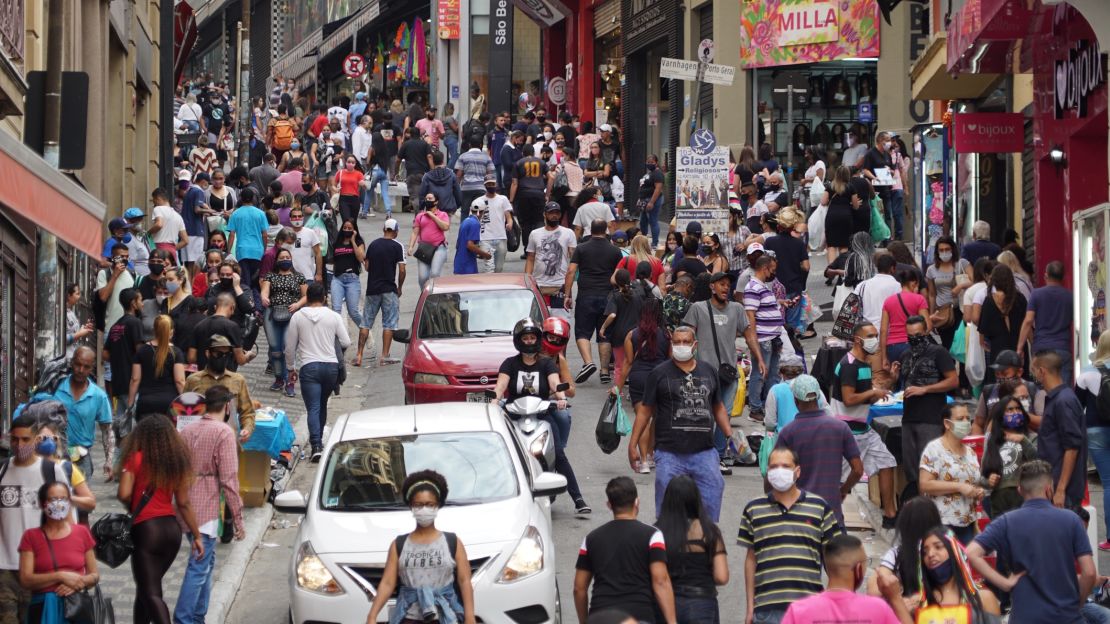In São Paulo, you can go to the market, hit a bar, attend Mass. All without wearing a mask, even though there have been more than 1.6 million cases of coronavirus in this country and deaths are continuing to rise.
The old town was busy Monday afternoon, on the first day of a new large-scale phase of reopening of Brazil’s largest city.

Shoppers were out on the streets and in stores, sellers pushed carts of watermelon and other merchandise and all around were sounds of human activity – not back to pre-pandemic levels, but a hum that has been absent from so many of the world’s cities.
Inside a bank, people queued with space around them but in the smaller shops and on the crowded streets there was no way to maintain social distance. The sight of a shopkeeper aiming a thermometer at a customer’s forehead was rare and while many wore masks, an alarming number did not.

No wonder, given the pandemic politics of Brazil’s man in charge.
Sometimes known as the “Tropical Trump,” President Jair Bolsonaro has derided Covid-19 from the beginning of the outbreak as just a “little flu.” He undermined his Health Ministry’s call for social distancing with showy, unmasked outings and eventually fired respected health minister Luiz Henrique Mandetta.
“Mandetta’s vision was that of health, of life,” Bolsonaro explained. “Mine is more than life, it includes the economy, jobs.” As the death toll topped 5,000 he said: “So what? I mourn but what do you want me to do about it? … I am not a miracle worker.”
With at least 65,000 deaths and 1.6 million confirmed cases, Brazil is now second only to the US in terms of national suffering. But tests remain hard to come by and as they dig mass graves from Rio to Amazonia, some local experts say the real number of the infected could be 12 to 16 times higher.

Yet as a testament to Bolsonaro’s power of persuasion on the 30% of the population that polls show are still loyal to him, one supporter I met was convinced that coronavirus is much ado about nothing.
“It could exist,” activist Mario Schwartzmann said. “But if it exists, it is weak.”
That is the attitude that makes Natalia Pasternak cringe. The microbiologist and president of the Question of Science Institute in São Paulo, was blunt in her assessment. “It’s crazy. Science is being ignored in this government as it has never been before,” she said.

After Bolsonaro fired his health minister and the replacement quit within a month, a loyal general with no public health experience is now in charge of Brazil’s pandemic response.
And after Donald Trump sang the praises of hydroxychloroquine, Bolsonaro ordered his military to stockpile millions of doses and ordered that the controversial malaria drug distributed in public clinics. “Even if even if there are no side effects, that is money that could go to buy ventilators and diagnostic test kits,” she said. And now an already overtaxed health system is bracing for a wave of patients who will need intensive care.
“This is really scary because we’re talking about opening churches and schools and pubs and restaurants,” Pasternak said. These are places where you get people together, which is exactly what we’re trying to avoid. And then these people are not even going to wear masks.”

The lower house of Congress did pass rules for mandatory mask wearing in churches, schools, shops and prisons, but Bolsanaro vetoed essential parts of them.
Pasternak is now fearful that Brazil’s massive public health system could be overwhelmed.
“We’ve never reached the situation that they reached in Italy, where the doctor is forced to choose the person that gets the ventilator,” she said.
“I hope we never come to that, but I’m afraid we might.”





